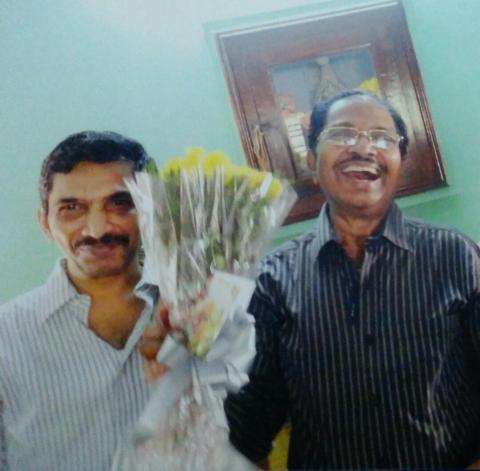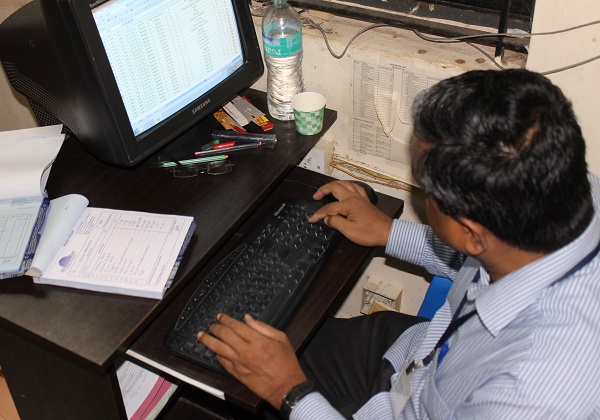I COULD NOT WEATHER THE STORMS THAT INHABIT MY SON'S MIND
June 18, 2017

Mr Manuel, 82 shares the journey of his son Prabhu's schizophrenia diagnosis at 15, the societal exclusion after the diagnosis, finding solutions to cope and live. His biggest worry continues to be "Who will take care of him when I’m gone?"
Being the father of child who has a mental illness is one of the hardest and most painful situations that one has to reconcile with in their life. It doesn't go away, it cannot be wished or prayed away, it can only be accepted. My son has been living with mental illness for the last 43 years. He has had no youth to speak of, no phases that he can move into as he grows older - just a haze of disordered thoughts, behaviours and medication. A fine looking boy who now looks like a shadow of his former self. I weathered all his storms with him except the storms that inhabit his mind. But I am his father and I love my child for everything that he is and will be.
My only son Prabhu is 58 years old, suffers from Schizophrenia and lives in a residential rehabilitation home for life time care for people with mental illness. He was diagnosed at the age of 15 and has been on medication and rehabilitation ever since. My wife and I live by ourselves in the same city as him. We are senior citizens. I am 82 years old, a retired railway employee.
My only son Prabhu is 58 years old, suffers from Schizophrenia and lives in a residential rehabilitation home for life time care for people with mental illness. He was diagnosed at the age of 15 and has been on medication and rehabilitation ever since. My wife and I live by ourselves in the same city as him. We are senior citizens. I am 82 years old, a retired railway employee.
Prabhu began to first exhibit symptoms when he was in school studying in the 9th standard. The school authorities called us for a meeting and we were told of complaints regarding his behaviour and decline in his studies. He was also showing signs of withdrawing from activities and keeping to himself. The School correspondent who was also a friend had been observing him and suggested that we should consult a psychiatrist. Initially I was angry with my son for his behaviour and with the school authorities for their complaints.
The very night I brought my son back home we had an untoward incident. Everyone was asleep but around midnight something disturbed my sleep and I woke up to find Prabhu sitting up on his bed and muttering something to himself. I softly stroked his back and asked him what was wrong and why he wasn't asleep. He replied saying that he couldn't sleep because he was hearing voices of God commanding him about right and wrong actions. I pacified him lovingly and told him that we would meet a doctor the very next day and he would be alright. He fell asleep soon after.
The following day I took him to the Psychiatrist attached to the railway hospital. After a lengthy conversation and evaluation, the psychiatrist confirmed the fact that he had a mental illness -Schizophrenia and prescribed medication. He was 15 years old.
The very night I brought my son back home we had an untoward incident. Everyone was asleep but around midnight something disturbed my sleep and I woke up to find Prabhu sitting up on his bed and muttering something to himself. I softly stroked his back and asked him what was wrong and why he wasn't asleep. He replied saying that he couldn't sleep because he was hearing voices of God commanding him about right and wrong actions. I pacified him lovingly and told him that we would meet a doctor the very next day and he would be alright. He fell asleep soon after.
The following day I took him to the Psychiatrist attached to the railway hospital. After a lengthy conversation and evaluation, the psychiatrist confirmed the fact that he had a mental illness -Schizophrenia and prescribed medication. He was 15 years old.
All of my good friends from different faiths advised me to visit their religious institutions like the Dargah, Church and Amman temple where prayers could cure my son. I listened to them patiently but I opted not to follow their suggestions. I made the choice of visiting the Psychiatrist and I still believe that was the right decision to make because after that I found my son sleeping peacefully and not spending distraught nights with thoughts that scared him.
Within a week the neighbours around our house got to know about his mental illness and suddenly we became pariahs in the community. They stopped inviting us for functions and their visits decreased in time. Even my son’s friends who were his constant companions earlier, partners in games of games of cricket, volleyball deserted him.
He was unable to study and so his education had to be stopped. He lived with us at home till the age of 27, working for some time in a manufacturing unit where he was able to carry out less functional activities. He then began attending the day care at a community home where he eventually has begun to spend the rest of his life.
He was unable to study and so his education had to be stopped. He lived with us at home till the age of 27, working for some time in a manufacturing unit where he was able to carry out less functional activities. He then began attending the day care at a community home where he eventually has begun to spend the rest of his life.

Pic: Mr. Manuel and his son Prabhu
The medication continues, he has had many relapses over the years and received Electro Convulsive Therapy on many occasions. As with any parent my greatest fear is what will happen to him after I’m no longer alive. Who will take care of him when I’m gone? Even though I have arranged for him to live in a well functioning long term facility, I will always worry about him.
Every weekend I visit him in the rehabilitation home and take his favourite food for him and we have him over to the house as much it is feasible for us. My wife is ageing and unwell too. This journey has continued for the last so many years but some power keeps us going and keeps us near each other.
Every weekend I visit him in the rehabilitation home and take his favourite food for him and we have him over to the house as much it is feasible for us. My wife is ageing and unwell too. This journey has continued for the last so many years but some power keeps us going and keeps us near each other.
Mr. Manuel is a member and treasurer of Aasha. Aasha is a ngo formed by caregivers of people with mental illness.
//www.patientsengage.com/personal-voices/i-could-not-weather-storms-inhabit-my-sons-mind-schizophrenia




